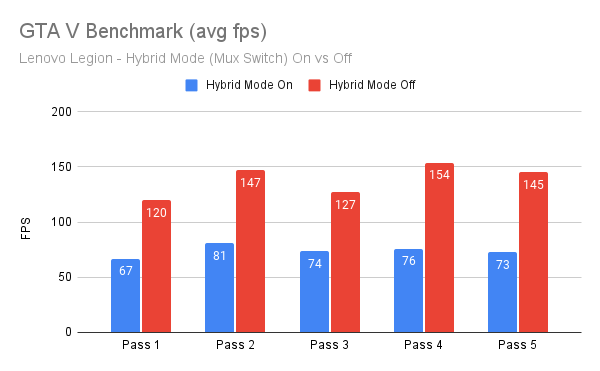Thoughts on Gaming Laptops
Sun 14 Aug 2022, 12:11
I got a gaming laptop earlier this year. I was moving and so I figured it'd be easier if I just gutted and sold my desktop and replaced it with a laptop, and so I did!
I got a 15" Lenovo Legion 5 Pro with an i7 11800H CPU, RTX 3070 Mobile GPU and 16 GB of RAM. For a while I upgraded the RAM in it to 64 GB but that was too much for me so I got rid of it pretty quickly and went back to the stock 16.
I got the machine right at the start of June, and by mid July I had built a desktop again.
What happened?
Well, let me tell you.
It's not a good replacement for a desktop. Not even thinking about the performance:money ratio, there are a bunch other aspects that makes it a lot worse than a desktop.
Let's start with a simple one: ergonomics. If you just put the laptop down on your desk and use it like that, your neck will constantly be strained because you have to look down at an angle.
The keyboard is also raised up a bit, and you get the sharp edge of the bottom of the laptop digging into your wrist.
The screen itself is also smaller, making you either go much closer with your face, or making the screen scale larger, which makes the usable area smaller.
Using a laptop on a desk for an hour or so occasionally is totally fine. But if you're gonna be using it like this for a long time, frequently, your body is gonna make you regret it.
Obviously, the solution you've been thinking of all along: get an external display!
Okay, so now with your external display, you've basically already reverted back to 50% of your classic desktop setup. The entire point of getting a laptop has already diminished by quite a bit because you now have a monitor permanently seated on your desk.
Apart from that you now also need to be thinking of how to connect to the monitor. Most computer monitors nowadays use Displayport, so to use that you need to get some kind of adapter, cable or docking station for your laptop. That's another cost.
Once you have your monitor set up, it probably won't take long until you want an external keyboard too (and mouse, obviously, but I figure you probably had that already even if you only used the laptop itself... who games with the trackpad?)
Now that you have an external keyboard, you need to put your laptop somewhere. You cannot put it on the floor like your desktop tower. You cannot close the lid on it and put it underneath the monitor or something because sooner or later you're gonna need to be able to access the internal keyboard for special functions, or maybe more importantly, you need to leave the lid open so the thermals are better (it sucks air through the keyboard).
So you need to put the laptop, lid open, somewhere on your desk. This actually takes up quite a bit of room, so it's not very ideal and your setup won't look neat and tidy.
Not to mention, with your keyboard and mouse you're likely using up 2 USB ports on the laptop so you're almost running out of ports. If you want to plug in something else, say a USB drive, you might need to get a hub or docking station, making your setup even less tidy.
But alright, you got your desktop-laptop setup now. Ergonomics are good. You're typing away on your favorite keyboard that is at the perfect height and your computer monitor is at eye level. The ergonomics are solved. So how is the actual experience of using a gaming laptop like this compared to an desktop?
Well, first off, it's a lot louder. A (relatively) tiny computer that is up on your desk right next to you is always gonna be louder than a large desktop computer you could have under your desk. When it's idle or you're just sitting in Windows it's not too bad, but when you're doing anything demanding, like gaming (which is kind of the entire point of a gaming laptop), it gets incredibly loud. Like hairdrier, PS4 Pro, jet engine loud. It's very unpleasant to listen to. Luckily, there are good headphones that can hide that from you, but only you. If there's anyone else around they might not enjoy the jet engine either.
Secondly, it's a lot less reliable. If you're connected to the internet through wifi your fate is up in the hands of the wifi gods. Sure, you can connect a ethernet cable, but then that's another cable to unplug when you go portable with your laptop. Your desktop will almost always be where it is, so having a hardwired ethernet cable to it is a nobrainer. But not only internet is unreliable. All the cables and docking stations you use need to reliable too. When I used my 4K 120 Hz computer monitor with this laptop, it would occasionally, albeit very unfrequently, go black once in a while, for a second or so. Sounds pretty unharmful, but it was very annoying.
You know how often that happened on my desktop? Never. A desktop goes from the GPU to a displayport cable to the monitor. With the laptop you're going from the laptop to some port on its motherboard to some kind of USB C adapter maybe to displayport cable to the monitor. There's a whole lot more that can go wrong on that chain.
Then there are a bunch of other factors about using a laptop like a desktop too. It has a battery for instance. This is actually kind of a good thing, as its like a free UPS in a way, but the downside is that the battery is mostly just sitting there becoming worse as its constantly being charged.
Overall, using a laptop as a desktop replacement is just worse than using an actual desktop in almost every way. Makes sense, as using a desktop as a laptop replacement would be worse in almost every way too.
Speaking of, let's look at what using a gaming laptop as a "normal" laptop replacement is like.
Well, as I already said, it's a lot heavier. My Macbook Air (which to be fair is the complete opposite of this gaming laptop) weighs practically nothing. You can easily pick it up with one hand and put it in the bag and not worry about it. It goes anywhere. This gaming laptop on the other hand, you probably want two hands to pick it up. It is very heavy, it barely fits in my bag and once it's there you can definitively feel it.
The battery is also not good, and here we get into a deeper problem with gaming laptops. They have 2 GPU's. They have the CPU's built-in graphics that are low power and not good at gaming. Then they have their dedicated GPU's that are high power but great at gaming.
The thing is, if you have both GPU's enabled, so you get low power when you need it and high power when gaming (Hybrid Mode as Lenovo calls it, I think it's more commonly refered to as Mux Switch) the dedicated GPU has to "passthrough" its data through the internal graphics. This causes quite the performance hit. How big of a hit? Well, look at this quick test I did in GTA V:
The gaming performance is almost 2x better when disabling hybrid mode.
So what's the big deal with disabling it then? Well, then your battery life is terrible. With Hybrid Mode on and not gaming, I get a couple of hours of usage before it runs out. Maybe 2-3 hours. With hybrid mode disabled, I get barely an hour.
Not only that, but the computer also runs much hotter when the fancy Nvidia GPU is constantly being used. If I have hybrid mode enabled, the computer will actually go truly silent when I'm in Windows, but with it off, the fan is always spinning (albeit at a fairly low speed, but it's audible).
So you have a choice to make. Do you:
leave hybrid mode on and enjoy the better battery life and more quiet computer, but suffer worse gaming performance
leave hybrid mode off and enjoy the better performance, but much worse battery and more loud computer
constantly toggle it on/off for when you need it (noting that it requires a reboot every time)
?
Neither choice is particularly good.
Finally, the laptop needs to be plugged in to have good gaming performance. I thought I could maybe use it in my lap to play FFXIV while I watched TV in the sofa, but no. The laptop practically always needs to be plugged in.
So overall, a gaming laptop is not good at being a laptop either. It works in a pinch if you need it to be a laptop, but if you need to bring a laptop with you often there are much better machines for you.
By now, I've established my opinion that a gaming laptop is not good at replacing your desktop or replacing your laptop. So what is it good for?
I can think of a couple of narrow scenarios:
If you're a PC gamer that likes mouse and keyboard, but don't have room for a permanent setup in your home and want to bring the laptop out for an hour or so every night on the kitchen table to play a game
If you're a kid with divorced parents and switch where you live every week. As a kid you probably won't mind the terrible ergonomics.
You very often go to LAN parties or other gatherings where you need to bring a gaming computer
You want a portable VR setup you can relatively easily bring with you. You'll just need the laptop and an Oculus Quest.
And that's pretty much it. In all other scenarios I think there are much better devices.
- If you're using a computer for several hours a day at the same desk: get a desktop
- If you bring your laptop into school to take notes every day: get a Macbook Air
- If you're traveling and want something to play at night: get a Nintendo Switch or Steam Deck
- You want to play games in the sofa while watching TV: get a Nintendo Switch or Steam Deck
This week I've been at my parents and so I brought my gaming laptop with me, and yep, it's been fine for me. I've been playing GTA 4 at nights and writing this by day, but I would've prefered a Steam Deck and my Macbook Air.
Overall, gaming laptops -- they've gotten a lot better recently, but they're not good at being a desktop, a laptop or a portable gaming device.

